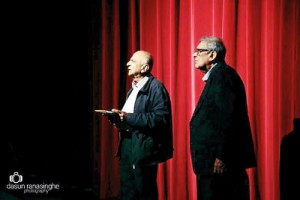Memories of ‘Maname’ brought back by ‘The Waving Tree’
Tomorrow is ‘Maname Day’. Dr. Ediriweera Sarachchandra’s epoch-making ‘nadagama’ – an opera in traditional style – had its opening night at the Lionel Wendt 58 years ago – on November 3,1956.
Dr. Sarachandra was Professor of Sinhala at the University of Ceylon, Peradeniya at the time he wrote and produced ‘Maname’ which was presented by the Sinhalese Drama Circle.
To honour Professor Sarachchandra and as part of his hundredth birth anniversary celebrations,the Melbourne Sinhala Theatre School along with Yashodhara Sarachchandra Liyanaarachchi, Kusumsiri Liyanaarachchi and Jayasri Chandrajit recently presented a programme of verse, song and dance from the works of Sarachchandra. It was highly appreciated by the Melbourne audiences.

Identifying Sarachchandra’s vision: Shyamon and Ernest walk onto the stage in pensive mood
What was termed ‘the only naturalistic mode item’, was a performance by the inimitable ‘pothegura’ in Maname, Shyamon Jayasinghe and playwright/actor Ernest Macintyre which gave an insight to what Dr. Sarachchandra would have wanted to depict in ‘Maname’.
Titled ‘The Waving Tree’ the script was by Macintyre with the collaboration of Shyamon and Hemamali Gunasinghe. Some of the script had been adapted from the original critical writings of Professor D.M. de Silva.
Here is the text of ‘The Waving Tree’.
(Two men, Shyamon and Ernest, in thoughtful state, enter the stage from the bottom stage left corner. Shyamon walks towards the audience gazing above their heads, while Ernest walks sideways to his right, studying some notes. Shyamon stops, at which Ernest stops.)
Shyamon: (Still gazing over the heads of the audience): What a lot of trees……..
Ernest: Yes……..but we were talking about Maname
Shyamon: Yes….sorry…..but all those trees there made me think of Maname…..
Ernest: What….
Shyamon: The forest in …….
Ernest: Hmmmm……anyway, here is a copy of the notes we made about the play (He walks up to Shyamon and hands him the papers) ……….Shyamon, the last words spoken by Princess Maname were:
“ In all the foolish world
Is there a woman who has suffered
Sorrow like mine?
Shelter me now
You Gods who rule the Triple World!
I pray you look to me
Look to me, look!
With compassionate eyes.”
Shyamon: Yes, and the Narrator brings the play to an end with the words:
“So in her breast, her heart broke, and
She died.
Hearing this tale of old that moves
Compassion
You who have listened patiently, bear with us for
Love;
No anger but pure pity of the mind
We pray you feel, O wise ones in
This audience.
Ernest: Yes………..
Shyamon: What do you think Professor Sarachchandra is saying?
Ernest: Sensitive and imaginative critics have said that Maname begins with two young people passionate about each other and hopeful of a wonderfully happy future, but innocent about any sense of evil, characterized by misfortune, that may cross their lives. Such mystery that cannot be understood is part of this world.And it works itself through unexpected, unplanned, sudden human action of a very complex kind, such as the princess surprising everyone by asking Maname not to kill the jungle king, who may have killed Maname if he was in Maname’s position. This unexpected situation came about because the evil in this world also works through circumstances that can hide from you, how you can get involved in such situations, like the circumstance of having to go through a forest, like the one here, for Maname and the Princess to get from Taxila to Benares.
Shyamon: The playwright acknowledges the littleness of human judgement when faced with, what you call, this mystery of evil, so he refuses to ascribe too easily to any man or woman his or her portion of guilt. If this is Sarachchandra’s vision it is frightening, because individual men and women are not called upon to share responsibility.
He feels , not anger but pity.
Ernest…..not anger, but pity
Shyamon: One other thing you can add to our notes. Something Sarachchandra did, in effect, for drama in Sri Lanka, which has not yet been correctly identified. We had no developed dramatic theatre, only rudimentary folk performances. When he created Maname and Sinhabahu and his many other plays using, poetry, song and dance in the twentieth century, in effect ignoring linear time, Sarachchandra was right. Great drama in the classical genre,would lead to new dramatists, yet to come, creating contemporary prose drama as great.
Ernest: You think so?
Shyamon: Yes. He knew that Ibsen and Chekhov, the great masters of modern prose drama had behind them the impetus of the classical drama of Greece, and Shakespeare. They could not have started from scratch.
Ernest: You may have a point there…
Shaymon: Yes, his plays will influence the future of this art for a very long time………like that tree over there…
Ernest: ( Unable to make the connection immediately)…. What…..?
Shyamon: (Slowly raising his arm indicating with his palm, over the heads of the audience )… See, that tree is dead, but it (raising his arm beyond the elbow, waving it to and fro) waves in the wind with the others. And so it seems to me that though he is no more, he is still part of life, one way or another……
(They bow, to the tree, and the audience, then move out slowly).


